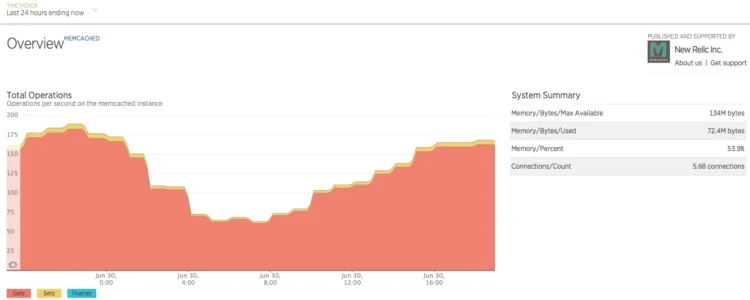I'm an admin migrating away from vb4 (yay! I took over from someone else).
New server stats running on Linode.com:
1. 1.5MM posts
2. 4GB RAM
3. 100GB SSD
4. CentOS7
5. VPS with the kernel using a Xen container
So I updated Xenforo to use front-end caching and back-end caching. I setup memcached to use 256MB of RAM and it will cache sessions as well. The site averages 30 users active, but can get up to 300 for brief periods of times.
So there's a couple of questions that we'd like to do. We've done a preliminary migration using MariaDB and plan to migrate by the end of next month.
Questions:
1. We are using MariaDB 5.5.41. According to some searches it uses InnoDB by default. Any suggested memory sizes to use for pooling? I couldn't seem to find a good up-to-date resource, but I found this https://www.percona.com/blog/2007/11/01/innodb-performance-optimization-basics/
2. Should I change MariaSQL's following variables:
> # Activate query cache
> query_cache_limit=2M
> query_cache_size=64M
> query_cache_type=1
> # Max number of connections
> max_connections=400
> # Reduce timeouts
> interactive_timeout=30
> wait_timeout=30
> connect_timeout=10
3. Should we increase or decrease the memory footprint of memcached based on #1 and #2?
4. I'm thinking of serving non-php files by having nginx use memcached (see https://www.igvita.com/2008/02/11/nginx-and-memcached-a-400-boost/). I want to move to a CDN in the near future, but this should be good enough for now. Is anyone else doing this?
5. Along with #2 and #5, I'm thinking of adding the following to nginx.conf
> location ~* .(gif|jpg|jpeg|png|ico|js|css)$ {
> root /path/to/your/yourwebsite.com;
> expires max;
> add_header Pragma public;
> add_header Cache-Control "public, must-revalidate, proxy-revalidate";
> memcached_pass 127.0.0.1:11211;
> error_page 404 = @dynamic_request;
> }
Am I going down the wrong path here?
New server stats running on Linode.com:
1. 1.5MM posts
2. 4GB RAM
3. 100GB SSD
4. CentOS7
5. VPS with the kernel using a Xen container
So I updated Xenforo to use front-end caching and back-end caching. I setup memcached to use 256MB of RAM and it will cache sessions as well. The site averages 30 users active, but can get up to 300 for brief periods of times.
So there's a couple of questions that we'd like to do. We've done a preliminary migration using MariaDB and plan to migrate by the end of next month.
Questions:
1. We are using MariaDB 5.5.41. According to some searches it uses InnoDB by default. Any suggested memory sizes to use for pooling? I couldn't seem to find a good up-to-date resource, but I found this https://www.percona.com/blog/2007/11/01/innodb-performance-optimization-basics/
2. Should I change MariaSQL's following variables:
> # Activate query cache
> query_cache_limit=2M
> query_cache_size=64M
> query_cache_type=1
> # Max number of connections
> max_connections=400
> # Reduce timeouts
> interactive_timeout=30
> wait_timeout=30
> connect_timeout=10
3. Should we increase or decrease the memory footprint of memcached based on #1 and #2?
4. I'm thinking of serving non-php files by having nginx use memcached (see https://www.igvita.com/2008/02/11/nginx-and-memcached-a-400-boost/). I want to move to a CDN in the near future, but this should be good enough for now. Is anyone else doing this?
5. Along with #2 and #5, I'm thinking of adding the following to nginx.conf
> location ~* .(gif|jpg|jpeg|png|ico|js|css)$ {
> root /path/to/your/yourwebsite.com;
> expires max;
> add_header Pragma public;
> add_header Cache-Control "public, must-revalidate, proxy-revalidate";
> memcached_pass 127.0.0.1:11211;
> error_page 404 = @dynamic_request;
> }
Am I going down the wrong path here?
